Barack Obama Meets Jen Psaki: An Embarrassing Moment and How She Recovered (Exclusive)
In her new book, 'Say More,' the former White House Press Secretary and MSNBC correspondent reveals what she's learned from her years in D.C.
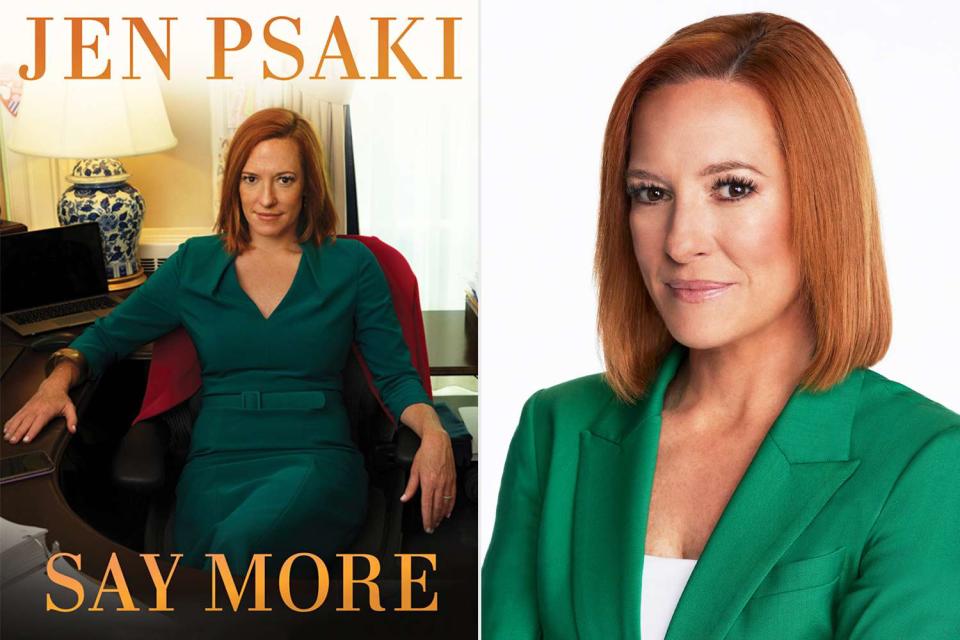
Scribner; Patrick Randak/MSNBC
Jen Psaki and her new book, 'Say More'Readers may know Jen Psaki as the White House Press Secretary under President Barack Obama, but the journalist also went on to serve under President Joe Biden and launched an MSNBC show that was later given a second slot ahead of Rachel Maddow. And now she's sharing her story, in a new book.
Say More: Lessons from Work, the White House, and the World, out May 7 from Scribner will offer lessons she's gleaned from the campaign trail, the briefing room and even motherhood.
Below, in an exclusive excerpt from her new book, Psaki reveals an awkward moment that happened the first time she met Obama (and another one, not too long after), how she recovered from it and what she learned about communication and self-advocacy that's inspired her along her career journey, so far.
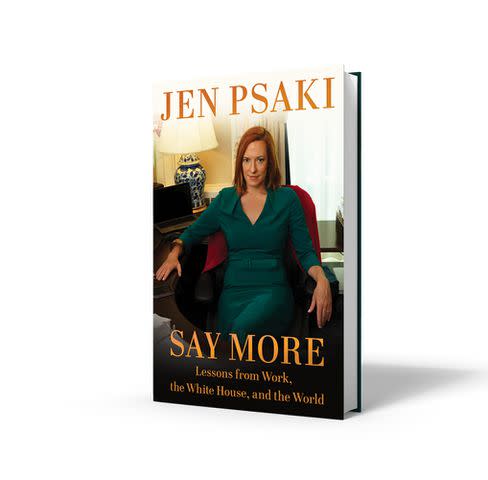
Scribner
'Say More' by Jen PsakiI was still in my twenties when I started working on Barack Obama’s presidential campaign. The then-senator from Illinois was a rising star in the Democratic Party who came to national attention after delivering a speech that brought the 2004 Democratic National Convention to its feet.
I was actually backstage in the hall that night, tasked alongside speechwriter Jon Favreau with prepping John Kerry’s daughters to speak at the convention the next night. I wish I could say we had both witnessed Obama’s historic speech live, but instead we were backstage with the sisters as they debated about the speaking order, just as my sisters and I probably would have.

Theo Wargo/WireImage
The Obama family in December 2014By the time I was working at the Democratic Congressional Campaign Committee with Rahm Emanuel, Obama was the most popular campaign surrogate—the politician most often asked to campaign for other Democrats. A lot of us already believed he would be the next president of the United States.
The first time I met him was months after I started working on the campaign and I’d been dispatched from Chicago to be the press staffer at a 2007 fundraiser in Cincinnati. When I arrived, I met up with members who escorted me to the tarmac and asked me to sit in Obama’s car so that we would be ready to leave when he arrived. While I waited, I wondered what I should say to this already larger-than-life figure. I thought I’d come up with a pretty good line when all of a sudden he opened the door and sat down.
“I bet you are wondering who I am and why I’m in your car?”
Never miss a story — sign up for PEOPLE's free daily newsletter to stay up-to-date on the best of what PEOPLE has to offer , from celebrity news to compelling human interest stories.
I felt pretty proud of myself that I spit it out. That didn’t last long. Somehow, in my slightly nervous delivery, I caught the arm of my purse on the door handle and half the contents flew across the backseat and into Obama’s lap. Pens, lipstick and possibly a tampon. He may have jumped, slightly, before giving me a subtly ironic look as he helped pick up my belongings now strewn across the floor of the car.
This pales in comparison to the time just a few months later when I made the poor choice of jumping over a literal hurdle at a campaign event, splitting my pants down the middle. I landed in a media report after Obama made an offhand comment that my pants looked “pretty X-rated.”
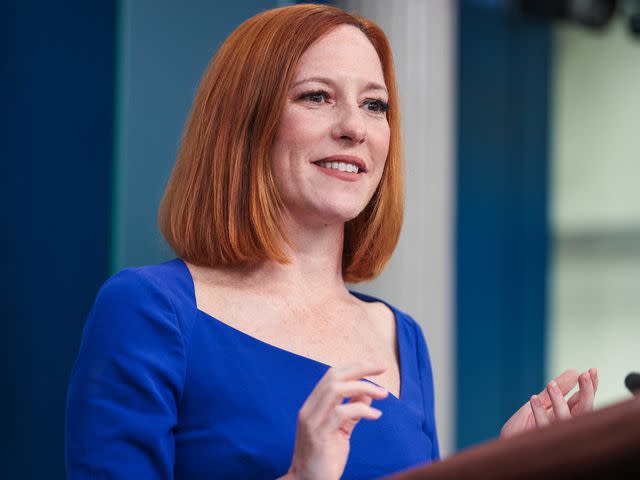
Pool/ABACA/Shutterstock
Jen Psaki in 2022Obama is calm and cerebral, in many ways the opposite of Rahm. He didn’t typically shout orders at staff (which made it that much scarier when he even slightly raised his voice). And when a staffer made a mistake, Obama’s reaction often reminded me of my mother, who simply says she’s “disappointed.”
Of course, dumping my purse into Obama’s lap wasn’t really a mistake; it was actually a good way to break the ice. My first actual mistake in this job came during the first campaign summer of 2008, when I missed a bus that was supposed to take me and a group of reporters from an event to Obama’s plane.
We weren’t stuck discussing a breaking news story. We were playing basketball in the gym and lost track of time. I am not even a hardcore basketball player; we were just taking a little break during a multi-day set of campaign events. Instead of traveling on that bus in the candidate’s motorcade, as we were supposed to, we had to take taxis and got stuck in horrible traffic.
Related: Former White House Press Secretary Jen Psaki Starts Work at NBC News: 'First Day. New Job.'
The plane didn’t leave without us, but by the time we got there, the Democratic nominee had been waiting an hour, mostly because he didn’t want to leave the reporters stranded. I sheepishly walked up to the front of the plane to apologize, bracing to get yelled at by an understandably upset Barack Obama for the first time.
“You are normally an A student,” he said, always the constitutional law professor deep down. “So I am going to let this one slide.”
Sometimes you can be both inspired and intimidated by someone’s public persona. The first few years I worked for Obama, from the campaign to the White House, I was nervous every single time I was expected to talk in his company. For starters, he’s legitimately brilliant and uniquely thoughtful in how he approaches big, challenging issues, and you often had the feeling he knew not only everything you were about to tell him but also everything you were supposed to be telling him but hadn’t had the time or high-enough IQ to learn. He holds his cards close to his chest.
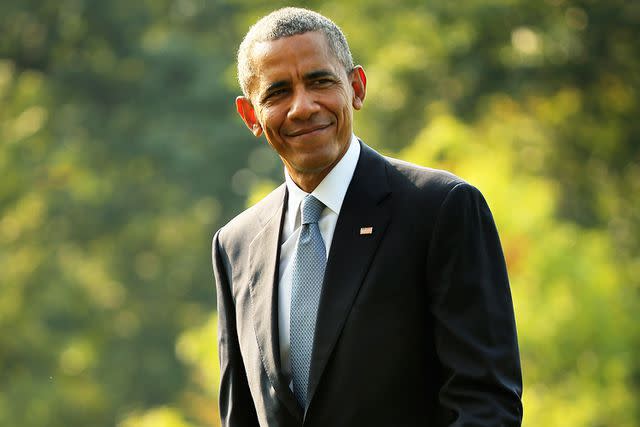
While he loves a good debate or conversation, and often seeks out the quietest person in the room for their thoughts, he can be uninterested in extensive feedback, especially if it is of the bloviating variety. It wasn’t my job at the time to provide him with a great deal of direct information, but I became paralyzed by the fear of saying something stupid, or inappropriate, in front of him.
As a result, I would try to blend into the back of the room and hope he wouldn’t ask me a question. I would even suggest others go in my place to meetings he’d be attending.
That fear was exhausting. Every day I was trying to navigate my job and daily responsibilities while also handling my insecurity and nerves about interacting with my boss. I couldn’t picture myself actually having a substantive role in those meetings. I couldn’t even envision what I would contribute. I believe they call this impostor syndrome.
Related: Lana Condor Says Michelle Obama Gave Her Advice on Dealing with 'Imposter Syndrome'
My solution at the time was to throw myself into being a team player. I sent detailed notes to my direct bosses so that they would be prepared for meetings, and I volunteered to call back reporters on their behalf when they were busy. I didn’t speak up or question much.
I worked long hours and developed a reputation for being one of the more organized and calm members of the team.
But that deference didn’t exactly position me as someone who could strategically drive an agenda—or who could grow into a much bigger role. This fear led me to worry that Obama saw me as an obedient junior staffer and not someone he could rely on for strategic or press advice—and given how I’d attempted to blend into the scenery, he wouldn’t be wrong to do so.
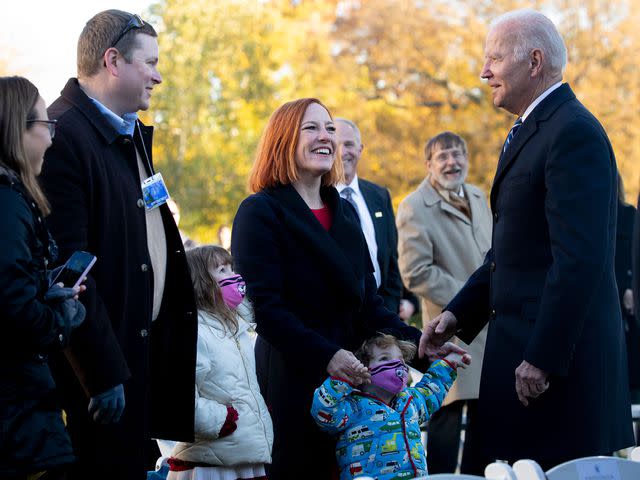
Shutterstock
Joe Biden, Jen Psaki, and Gregory Mecher at the 74th National Thanksgiving Turkey presentation in 2021I called Robert Gibbs, who had been the White House press secretary during the first two years of Obama’s first term, for advice on how I could shift the President’s perception and establish myself as the person who deserved to be the one briefing him for political interviews and public engagements on the road—how I could possibly see myself as equipped to give the president feedback.
Gibbs’ advice has always stuck with me because it was so simple—and delivered with a hint of his trademark southern drawl. “Act like you belong there,” he said, “because you do, and at a certain point everyone else will believe it, too.” I took the advice, and while I still remember the level of intense nervousness before my first campaign trip that year, after a while it got easier. I did start to believe I belonged there.
Excerpted from Say More: Lessons from Work, the White House, and the World by Jen Psaki. Copyright 2024 © by Jen Psaki. Reprinted by permission of Scribner, an Imprint of Simon & Schuster, LLC
Say More: Lessons from Work, the White House, and the World by Jen Psaki is on sale May 7, and available for preorder now, wherever books are sold.
For more People news, make sure to sign up for our newsletter!
Read the original article on People.


